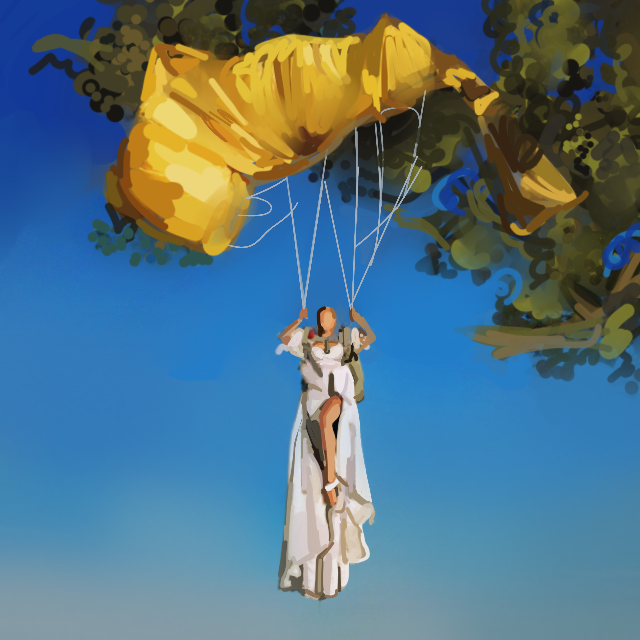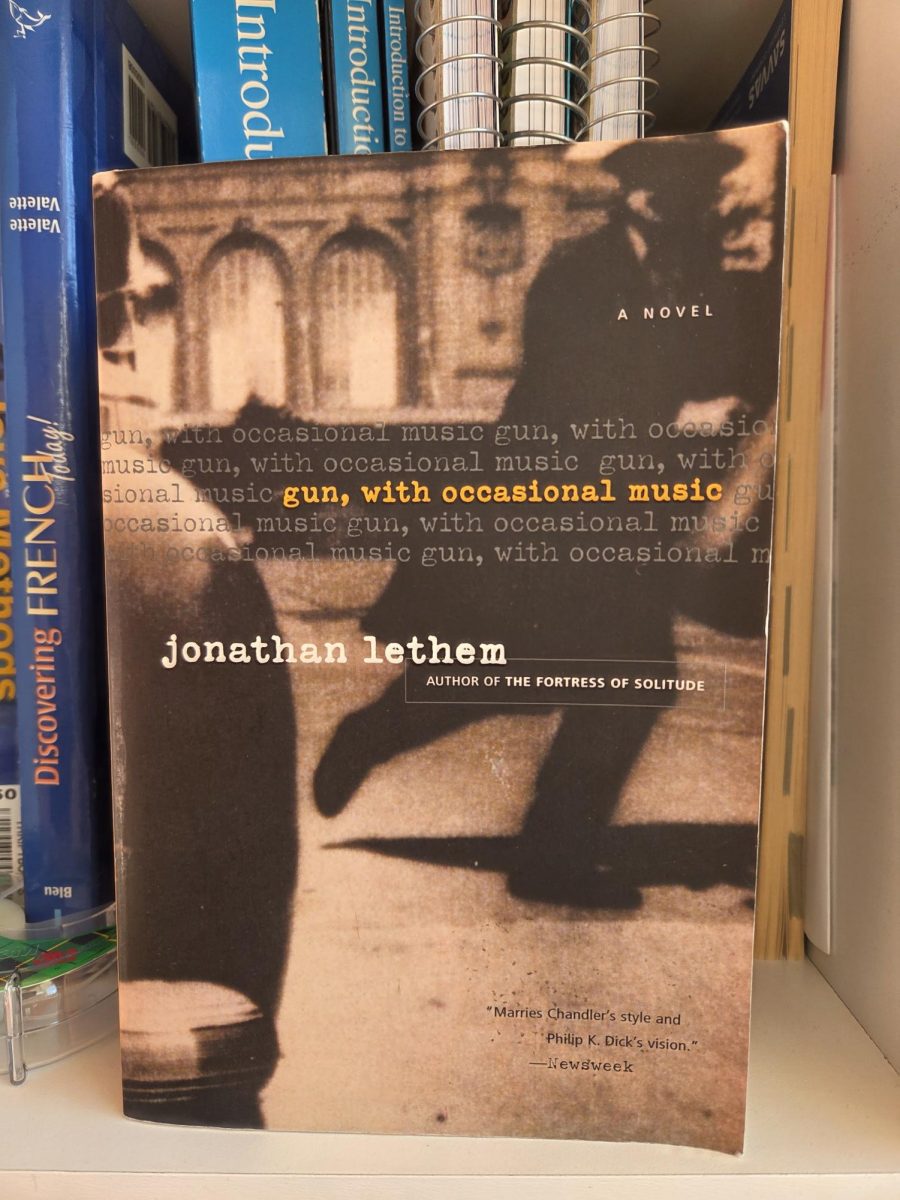Any student walking from class to class (hurrying, if the trek is from Dobbins to Shah), runs the risk of collision: I speak, of course, of the countless students I see walk past with their heads down, staring at their phones.
Phones are an escape from the present moment, which we’re often told to stay in. But I’ve been curious about the idea of what being present means. Mary Oliver’s poem “The Summer Day” offers a beautiful perspective:
Who made the world?
Who made the swan, and the black bear?
Who made the grasshopper?
This grasshopper, I mean —
the one who has flung herself out of the grass,
the one who is eating sugar out of my hand,
who is moving her jaws back and forth instead of up and down —
who is gazing around with her enormous and complicated eyes.
Now she lifts her pale forearms and thoroughly washes her face.
Now she snaps her wings open, and floats away.
I don’t know exactly what a prayer is.
I do know how to pay attention, how to fall down
into the grass, how to kneel down in the grass,
how to be idle and blessed, how to stroll through the fields,
which is what I have been doing all day.
Tell me, what else should I have done?
Doesn’t everything die at last, and too soon?
Tell me, what is it you plan to do
with your one wild and precious life?
Oliver’s poem is symmetrical in that it’s bookended by two sets of three questions. They’re important, almost theological — all three lines begin with powerful spondees, one stressed syllable after another. The first of these is the most lofty: “Who made the world?”
Yet the speaker never considers the nature of this creator. Instead, her questions have a childlike curiosity, but not from a lack of thoughtfulness: the deep, cloudlike thoughts that float across an idle mind. Her focus isn’t on answering them; rather, she revels in the awe of asking, of asking and looking deeply.
The next section of the poem, punctuated by unrhymed couplets, personifies the grasshopper. Having let her thoughts wander, the speaker pries us from the abstract world of questioning to the here-and-now.
While the poem is fittingly in free verse, bits of meter give the insect a sense of life. For instance, Oliver uses an iamb — an unstressed syllable and a stressed one — followed by three anapests — a combination of unstressed-unstressed-stressed syllables — in her description of the grasshopper as “one who has flung herself out of the grass.” That line’s bouncing rhythm mimics the grasshopper’s jumping into the speaker’s hand. These metrical choices show how the speaker finds depth and order in the chaos of life.
By far the most famous, the final two lines of this poem are also the most quoted on social media: “Tell me, what is it you plan to do / with your one wild and precious life?” The speaker’s message, though, isn’t a motivational plea about working hard to make the most of life.
Instead, she says, you don’t have to do anything with your wild and precious life besides just being alive in it. This tranquility is antithetical to Harker’s sometimes-obsessive grind culture, and the relentless focus on doing and getting things done.
Whether it’s tomorrow’s test or college, the future is always on students’ minds at our school. But Oliver’s use of “plan” is a bit misleading, because the wild and precious life she’s talking about isn’t in the future at all. It is right now. The present moment defies planning. It is right now. Did you notice it? It is right now, and it is literally all you know for sure: but also ephemeral, floating away like a grasshopper — slipping through your fingers: “Doesn’t everything die at last, and too soon?”
In a 2015 interview with journalist Krista Tippett, Tippett brought up this poem as “A Summer Day,” but Oliver corrected her: “The Summer Day.” The definite article makes all the difference because the grasshopper is a real grasshopper, and that same summer day is alive in Oliver’s mind even 25 years after the poem’s publication.
The most ephemeral moments have the ability to penetrate the membrane of short-term memory. They can float down and settle in those fathomlessly grandiose rooms of the deep mind, their transience ironically giving them lasting and definite power.
Thus, Oliver offers a solution to the hallway phone collision problem. The inevitable, thankless rhythms of our wild high school lives — of grades, of assignments, of comparison — make for busy days, but poor memories: the essay, the chemistry assignment, the math problems all blur together in the brain.
There is no easy way to escape any of these responsibilities. But you can train your mind. Shift your mindset to appreciate and sink into the deep, memorable spaces of small moments.
A lofty goal, but also a practical one. Keep your phone in your backpack during the passing period, and smile at someone in the hallway. Close your laptop screen and breathe. Set aside time to do nothing, or to just socialize with friends. Most importantly, look around.
And if you look hard enough, you will find grasshoppers everywhere and meet the gaze of “enormous and complicated eyes” all around you. Plumb their depths.
I remember walking in the quad last April. I was one of the last people on campus that day, and it had been a stressful one. But I saw it all in that moment, breathed it in and out. My phone buzzed with a text message; I didn’t check. And I just stood there for two minutes, or five, or ten, and I watched the funny shapes of the clouds in the sky, and I smelled the spring flowers. This, I thought, is what it’s like to be “idle and blessed,” what I should have been “doing all day.”
I just stood there.




![LALC Vice President of External Affairs Raeanne Li (11) explains the International Phonetic Alphabet to attendees. "We decided to have more fun topics this year instead of just talking about the same things every year so our older members can also [enjoy],” Raeanne said.](https://harkeraquila.com/wp-content/uploads/2025/10/DSC_4627-1200x795.jpg)


















![“[Building nerf blasters] became this outlet of creativity for me that hasn't been matched by anything else. The process [of] making a build complete to your desire is such a painstakingly difficult process, but I've had to learn from [the skills needed from] soldering to proper painting. There's so many different options for everything, if you think about it, it exists. The best part is [that] if it doesn't exist, you can build it yourself," Ishaan Parate said.](https://harkeraquila.com/wp-content/uploads/2022/08/DSC_8149-900x604.jpg)




![“When I came into high school, I was ready to be a follower. But DECA was a game changer for me. It helped me overcome my fear of public speaking, and it's played such a major role in who I've become today. To be able to successfully lead a chapter of 150 students, an officer team and be one of the upperclassmen I once really admired is something I'm [really] proud of,” Anvitha Tummala ('21) said.](https://harkeraquila.com/wp-content/uploads/2021/07/Screen-Shot-2021-07-25-at-9.50.05-AM-900x594.png)







![“I think getting up in the morning and having a sense of purpose [is exciting]. I think without a certain amount of drive, life is kind of obsolete and mundane, and I think having that every single day is what makes each day unique and kind of makes life exciting,” Neymika Jain (12) said.](https://harkeraquila.com/wp-content/uploads/2017/06/Screen-Shot-2017-06-03-at-4.54.16-PM.png)








![“My slogan is ‘slow feet, don’t eat, and I’m hungry.’ You need to run fast to get where you are–you aren't going to get those championships if you aren't fast,” Angel Cervantes (12) said. “I want to do well in school on my tests and in track and win championships for my team. I live by that, [and] I can do that anywhere: in the classroom or on the field.”](https://harkeraquila.com/wp-content/uploads/2018/06/DSC5146-900x601.jpg)
![“[Volleyball has] taught me how to fall correctly, and another thing it taught is that you don’t have to be the best at something to be good at it. If you just hit the ball in a smart way, then it still scores points and you’re good at it. You could be a background player and still make a much bigger impact on the team than you would think,” Anya Gert (’20) said.](https://harkeraquila.com/wp-content/uploads/2020/06/AnnaGert_JinTuan_HoHPhotoEdited-600x900.jpeg)

![“I'm not nearly there yet, but [my confidence has] definitely been getting better since I was pretty shy and timid coming into Harker my freshman year. I know that there's a lot of people that are really confident in what they do, and I really admire them. Everyone's so driven and that has really pushed me to kind of try to find my own place in high school and be more confident,” Alyssa Huang (’20) said.](https://harkeraquila.com/wp-content/uploads/2020/06/AlyssaHuang_EmilyChen_HoHPhoto-900x749.jpeg)











dyuthi • Oct 9, 2025 at 1:02 pm
wow! amazing analysis and writing, shreyas. fantastic work on this piece!
Benjamin Li • Oct 6, 2025 at 3:47 pm
This is so great! The analysis gave me a deep view of this poem, and the interpretation of the last two lines was really insightful! I’m so glad I was exposed to this poem and its meaning, and I really like how it was connected to our life. From now on, I’ll be sure to just stop and appreciate the present.
charlene • Oct 6, 2025 at 1:38 pm
hi shreyas i love this concept of “stanzas with shreyas” !! your analysis of the poem is so in-depth and thoughtful and introduced me to an astounding piece of work that i had not heard of before. overall, this piece is SO well-written